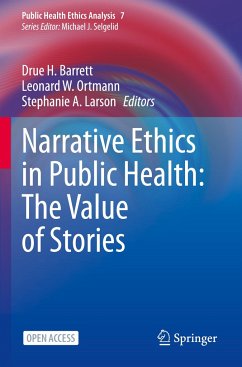
The Ethics of Vaccination
Versandkostenfrei!
Versandfertig in 6-10 Tagen
38,99 €
inkl. MwSt.

PAYBACK Punkte
19 °P sammeln!
This open access book discusses individual, collective, and institutional responsibilities with regard to vaccination from the perspective of philosophy and public health ethics. It addresses the issue of what it means for a collective to be morally responsible for the realisation of herd immunity and what the implications of collective responsibility are for individual and institutional responsibilities.The first chapter introduces some key concepts in the vaccination debate, such as 'herd immunity', 'public goods', and 'vaccine refusal'; and explains why failure to vaccinate raises certain e...
This open access book discusses individual, collective, and institutional responsibilities with regard to vaccination from the perspective of philosophy and public health ethics. It addresses the issue of what it means for a collective to be morally responsible for the realisation of herd immunity and what the implications of collective responsibility are for individual and institutional responsibilities.
The first chapter introduces some key concepts in the vaccination debate, such as 'herd immunity', 'public goods', and 'vaccine refusal'; and explains why failure to vaccinate raises certain ethical issues. The second chapter analyses, from a philosophical perspective, the relationship between individual, collective, and institutional responsibilities with regard to the realisation of herd immunity. The third chapter is about the principle of least restrictive alternative in public health ethics and its implications for vaccination policies. Finally, the fourth chapter presentsan ethical argument for unqualified compulsory vaccination, i.e. for compulsory vaccination that does not allow for any conscientious objection.
The book will appeal to philosophers interested in public health ethics and the general public interested in the philosophical underpinning of different arguments about our moral obligations with regard to vaccination.
The first chapter introduces some key concepts in the vaccination debate, such as 'herd immunity', 'public goods', and 'vaccine refusal'; and explains why failure to vaccinate raises certain ethical issues. The second chapter analyses, from a philosophical perspective, the relationship between individual, collective, and institutional responsibilities with regard to the realisation of herd immunity. The third chapter is about the principle of least restrictive alternative in public health ethics and its implications for vaccination policies. Finally, the fourth chapter presentsan ethical argument for unqualified compulsory vaccination, i.e. for compulsory vaccination that does not allow for any conscientious objection.
The book will appeal to philosophers interested in public health ethics and the general public interested in the philosophical underpinning of different arguments about our moral obligations with regard to vaccination.














